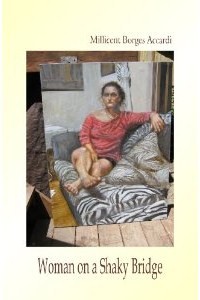Millicent Borges Accardi has received poetry fellowships from the National Endowment for the Arts, the California Arts Council, the Barbara Deming Foundation, Jentel, and the Corporation of Yaddo. Her work has appeared in over 50 literary publications including Nimrod, Tampa Review, New Letters and Wallace Stevens Journal as well as a in Boomer Girls (Iowa Press), Chopin and Cherries (Moonrise Press 2010), To Honor a Teacher (Andrews McMeel) anthologies. She lives in Topanga, CA and telecommutes as a technical writer. Her chapbook, Woman on a Shaky Bridge is with Finishing Line Press. Link to author’s site: http://www.MillicentBorgesAccardi.com
Can you tell us a little about your life as a poet?
I try to write every day--but not at a set time. I'm of the school of writers who believe in automatic writing and "the muse," preferring to wait until a poem comes to me, rather than forcing it. However, that said, I am not opposed to making the muse comfortable (with freewrites, reading poetry, looking at prompts, meeting with other writers). Still, I firmly believe that the poems grab me, rather than the other way around. My day job as a mostly remote technical writer/instructional designer supports my creative writing in that I have a varied schedule and no commute so I have either no down time or a lot of down time---which is what seems to work for me, in generating or making poems. When I get a grant or a residency, I am able to focus solely on the poetry (for these opportunities I am grateful).
Since you commune well with the muse, how helpful was she in the process of creating a chapbook? Did you find poetic inspiration leading you down a certain path of writing, such as a series of poems or were your poems just as varied as your schedule?
The chapbook was a combination of what I call "Prague poems," jazz poems and two others. The Prague poems are called that because they are either about or were written in Eastern Europe (Cesky Krumlov, Prague, Berlin) and deal with women in crisis. For Woman on a Shaky Bridge, I wanted ten of what I thought (at the time) were my strongest poems (in one place). From a practical point of view, my "muse" or ghost is not around when I do the business of writing, so I would have to say that the muse definitely did not select the poems or help with the order of things. I'd also add that the muse is not usually available for revision or sending out submissions. Wonder why she abandons me then?
The muse can be pretty fickle can’t she? Or he? Or it? Do you think wrote more of your Prague poems while in Eastern Europe or while in other places? And would you like to share an excerpt from one of those poems with us?
Although this sounds elitist, when I am IN a place, I kind of am IN it and I typically do not write. Like, I am not exactly the poster child for what artists or writers are supposed to do, be dutifully at their easels or desks for the duration of a fellowship or residency. Mostly what happens is that live in a place while I am there. I soak up the rays of the locale. Often I am frustrated because I FEEL as if, damn it, I should be creating, but I usually don't. I'm not saying residencies aren't valuable; I'm just saying that I use them in a different manner. Here are a couple of examples. Like, in Prague: I walked, I saw films and went to music shows. I went to cemeteries and visited the opera house, beer halls, the Charles Bridge, the castle. I read books that took place there, I read books by CZ authors, I rode trams and trains and buses. I drank pivo and Becherovka. I ate fried cheese and potatoes and trout. I 'tried" to write, but ended up (at best) taking notes, scribbling little thoughts in weird places, on the backs of papers or on my hands. As best as I could, I translated those notes into a journal before I left. THEN, six months later, the muse arrived and the poems fell into place. This past fall, I was in Cesky Krumlov. I read 20 books; I walked the city, saw two puppet shows, a torture museum, the castle, the bridges, the Valtava River, the rafters on the river. I saw Egon Schiele's house; I saw prewar photographs. I kept odd hours. I made soup. Then, wrote like crazy my last two days onsite. So, you see? It makes no sense.
Here is the opening of “In Prague”
Men jackhammer the corner of Jilska and Mickalska,
disturbing the air's intonation. The exposed
sewer pipes, inches from open graves, lie like illness.
As we watch, morning beaten from bodies escapes
in a white whirl of cameos, sand, and milk.
I love that you say you often can’t write when you are physically in the place. I thought that was just me! I went to Tokyo in 2006 and this year was the first year I managed to write an essay about the trip (still waiting on the poems to happen). Your chapbook and your bio indicate a love of travel. Do you plan to apply for grants and jobs that will allow you to travel more or is that just a lovely side effect?
I love to travel. Although I have to say I hate being a tourist. My favorite type of travel is to go somewhere and "live" there for at least a month, go to local grocery stores and hang outs, to explore--from the viewpoint of a dweller rather than a sight-seer. I often visit places and miss entirely the major tourist points and then on the last day scramble around so at least the people back home will be satisfied that, yes, I did see THAT. Ideally, travels are through residencies or trips to visit and/or stay with friends. Like a recent trip to Copenhagen where I got to visit and catch up with the artist Anne-Suzette Sadolin (I'd met her in Spain at a residency). Instead of seeing the little mermaid in the harbour, she took my husband and I to see Christiana (one of the last remaining hippie-commune-arts community on the planet).
Also, I like that fate determines my treks. I apply for residencies all over and hope for the best. When I am lucky enough to be invited, I go, whether it is winter in Wyoming or Vermont or late summer in New York. I like exploring and carry my passport with me at all time (a girl never knows when the opportunity will arise for a spur of the moment trip to Istanbul or Rome). For Cesky Krumlov, I targeted Milkwood residency because I had written the series of Cz-inspired "Prague poems" and wanted to be back in eastern Europe for final edits and to revisit not only my own words but revisit my thoughts about being there.
When did you know you were creating a chapbook?
I have a bunch of "collections." I write and then I put a sequence of poems together and, if I am lucky, the pieces and the sequence work out. I have a full-length collection called Injuring Eternity which will be coming out with World Nouveau through Mischievous Muse Press. The title of this book is taken from the quote: As if you could kill time without injuring eternity. --Henry Thoreau
What advice would you have for other writers?
Advice for other writers? That's easy. Read. So many of my students who wanted to be "writers" or "poets" or "novelists" could not name ten authors. Many did not even have a favorite. At best, they had read a few classics in school or had a favorite detective or thriller series that they followed, but most just wanted to be writers.
In any other craft, this notion would be absurd. Even in the business world, there is on-the-job training, field work, and/or certification. For example, would someone just expect to become an expert cabinet maker without having ever seen a table, without studying the work of a master craftsman? Without having apprenticed to someone who made incredible cabinets.
So many writers just expect to be original and unique and to have a voice when they don't know what others have written before them, or care. If you want to write, read. Read things you think you will like and read things you think you won't. Expand your horizons. Visit how other novelists have handled similar topics to those you want to write about. Explore style, explore voice and diction. I think by far the best teachers of writing are books.
Interview by Jessie Carty.
Poets’ Quarterly | Winter 2011.

